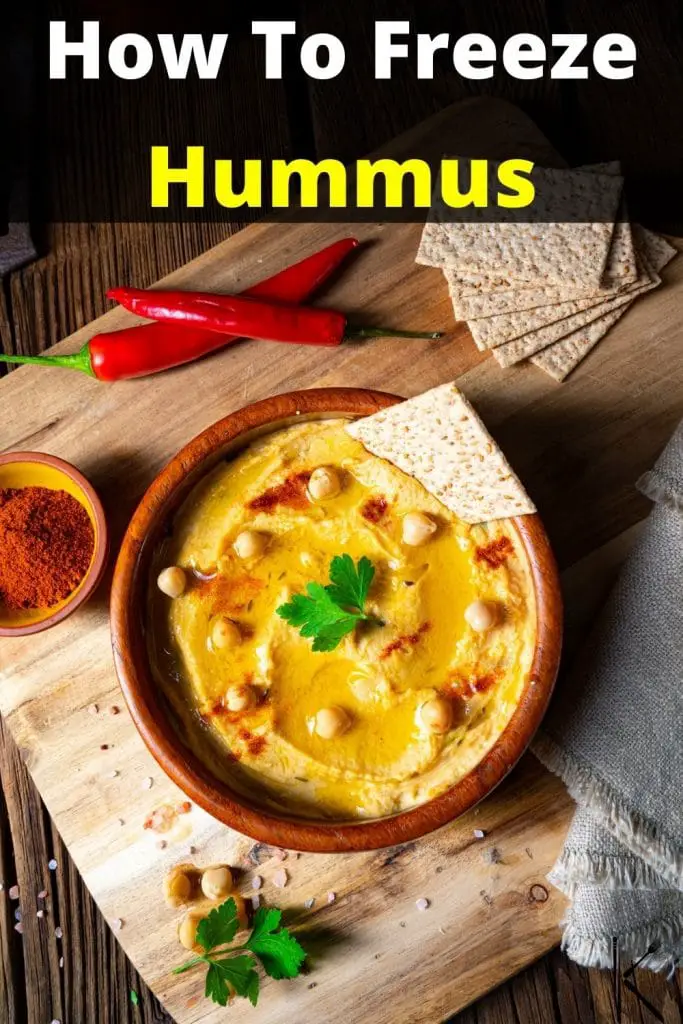In summary: Yes, you can freeze hummus to prolong its shelf life, but be aware that the consistency may change slightly on thawing, and it’s best to use fresh hummus for freezing to maintain the best quality.
Hummus is rich, creamy, and full of good nutrition. This delicious and popular chickpea dip is easy to make at home but sadly doesn’t last very long. Homemade hummus will only last up to 5 days in the refrigerator.
So, what do you do if you’ve made or bought a big batch that you can’t finish?
The good news is that you can freeze hummus to preserve it for a few months. This means you can make use of bulk specials without seeing any of it go to waste.
Here is everything you need to know about freezing hummus.
Can Hummus Be Frozen?
Yes, you can freeze hummus to prolong its shelf life. You may, however, find that the consistency will change slightly on thawing. The degree of change will vary depending on the brand of hummus you purchase and the ratio of ingredients.
The longer hummus is frozen, the higher the risk of freezer burn and drying out. Pouring a thin layer of olive oil over the top helps it stay fresh and assists in preserving the texture and taste of the dip.
It is essential to keep the hummus in a freezer-friendly airtight container. Do not freeze homemade hummus or store bout varieties that are already a couple of days old. The flavor and texture won’t be great once thawed. The fresher the hummus is when you freeze it, the better the quality will remain during storage.
How To Freeze Hummus
Step 1: Portion
Portion the hummus into an airtight freezer safe container in the quantity you will want to defrost at a time.
Keep in mind that you will have to use the entire container of hummus on defrosting since it cannot be frozen again. If you only use small portions at a time, use a couple of smaller containers or a freezer bag for individual servings.
Leave about an inch of headspace at the top of the container as the hummus will expand on freezing. If the container is filled to the brim, it could crack or the lid will pop off resulting in freezer burn and a poor quality product on defrosting.
Step 2: Drizzle Olive Oil
Drizzle a thin layer of olive oil over the top of the hummus to form a coating. This helps to prevent moisture loss and prevent the absorption of freezer odors. Dried-out hummus will become grainy and is more prone to develop a freezer burn taste.
Step 3: Label and Freeze
Label the hummus containers with the date and contents. This will help you keep track of how long it has been stored. Use a permanent marker to label the container.
Alternatively, to avoid staining the container, stick a strip of scotch tape on the lid. Use the permanent marker to write on the scotch tape and remove the tape once you have used the hummus.
How To Thaw Frozen Hummus
The best way to thaw hummus is to remove the container from the freezer and place it in the refrigerator overnight. You may find that the hummus separates on thawing, but that is perfectly normal and does not mean that it has spoiled. Simply stir the thawed hummus well to reconstitute its creamy consistency.
Add a little olive oil to the dip when mixing if needed to get it back to its original texture. Keep in mind that textural changes will vary according to the ratio of ingredients and brand manufacturer.
To spice up the taste, you can opt to sprinkle paprika, cumin, or black pepper over the top. Finely chop and mix in onions, minced garlic, or bell peppers for a hummus dip makeover.
Once hummus is thawed, use it within 5 to 7 days.
Types of Hummus
Hummus is made by blending chickpeas, tahini, fresh lemon juice, and minced garlic to form a smooth or slightly chunky ready-to-eat paste. It is used as a dip, spread, or addition to savory dishes, particularly in Middle Eastern cuisine.
Hummus is popularly served as an appetizer with flatbread for dipping, or as part of a meze platter with falafel, roasted red peppers, eggplant, fish, or chicken.
Varieties of hummus include the addition of different fresh herbs, spices, peppers, beetroot, or chopped onions. The additions give it a different color and more pronounced flavor depending on the ingredient added.
Hummus garnishes also come in a variety of ingredients including parsley, coriander, tomato, cucumber, mushrooms, onions, chopped boiled eggs, olives, pickles, pine nuts, and most commonly extra virgin olive oil.
FAQs
Conclusion
Hummus is a healthy and delicious dip made from chickpeas. Whether using it in a snack platter, lunch, salad, or addition to the main meal, it adds a rich and creamy texture and taste to round off the perfect bite.
To preserve your hummus for a few weeks or months, freeze it in an air-tight freezer safe container while it is still fresh. Once thawed, give it a good stir and mix in some olive oil and spices. Freezing a big batch of hummus is a great way to save on food waste, time, and money.
Also check our guides to learn how to freeze salsa, mayonnaise, applesauce, cranberry sauce, and alfredo sauce.
See more: Does hummus go bad?

*image by dar19.30/depositphotos









